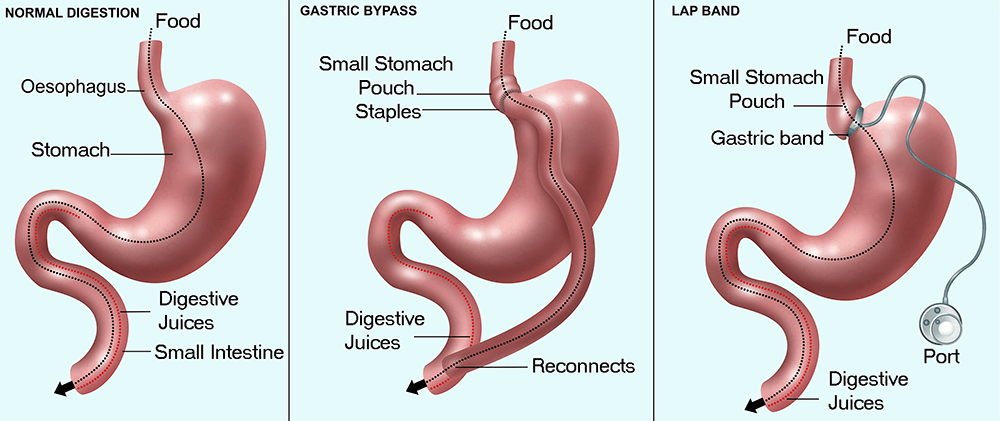Bariatric surgery is usually offered to people who are very obese (with a body mass index over 40), or people with a body mass index over 35 who have other serious health problems like diabetes or heart disease.
We can consider bariatric surgery, but only after trying alternatives.
What is bariatric surgery?
Bariatric surgery is surgery that affects the stomach and how food is digested. It is designed to make the stomach much smaller, which causes the person to feel full after eating only a small amount of food.
What are the types of bariatric surgery?
The most common types in Australia are lap band surgery (called gastric banding), gastric bypass (called Roux-en-Y gastric bypass) and gastric sleeve surgery (called sleeve gastrectomy). The surgery is usually done as a keyhole procedure, in which there are a number of small cuts in the abdomen. But sometimes, open surgery with larger cuts is needed.
In lap band surgery, an adjustable ring is put around the top part of the stomach to create a very small pouch that increases the time food remains in the top part of the stomach.
In a gastric bypass, a small stomach pouch is created by stapling. This is joined directly to the small intestine after some of the intestine has been removed. Food bypasses most of the stomach and fewer calories are absorbed.
In gastric sleeve surgery, most of the stomach is removed, including the part that makes a hormone that creates hunger.
Most people lose weight for 1 to 2 years after gastric bypass or gastric sleeve surgery, and then they stop. The process takes longer with lap band surgery.

When should I consider bariatric surgery?
Bariatric surgery is usually offered to people who are very obese (with a body mass index over 40), or people with a body mass index over 35 who have other serious health problems like diabetes or heart disease.
You could consider bariatric surgery, but only after trying alternatives. The first step is usually to try changes to what you eat and drink, and what daily activity and exercise you do. There are some medicines that can help people lose weight. Surgery is usually thought about only after these other options have been tried.
The health benefits of weight loss include improvements in type 2 diabetes, lower blood pressure and improved heart health.
Which type of bariatric surgery is right for me?
Many factors will determine which type of surgery is the best type for you, including how much weight you need to lose and any illnesses you might have.
Your doctor will do a detailed assessment and discuss with you the best option, including the risks.
What can go wrong?
Every operation has risks. You might pick up an infection, lose a lot of blood, or react to the anaesthetic.
There are different specific risks for the different types of bariatric surgery. For example, lap band surgery is safer than gastric bypass. Ask your doctors and surgeon what risks you face.
What can I expect after bariatric surgery?
To lose weight and keep it off after bariatric surgery, you will need to make significant lifestyle changes. For example, you will need to follow dietary guidelines, and you’ll probably take vitamins or other supplements for life. Your weight loss program will also involve increased physical activity.
After the surgery, you will start with liquid foods. Over the next few weeks, you will change to pureed food, then solid food. Your meals will be much smaller and you may have to stop drinking with meals due to your small stomach.
In some cases, people will initially lose weight but then their body becomes used to the changes made during the surgery and they can regain some of the weight.
What are the alternatives to bariatric surgery?
The alternatives to bariatric surgery are lifestyle changes, such as diet and exercise, or lifestyle changes combined with weight-loss medicines. You can get professional help with this: ask your doctor.
